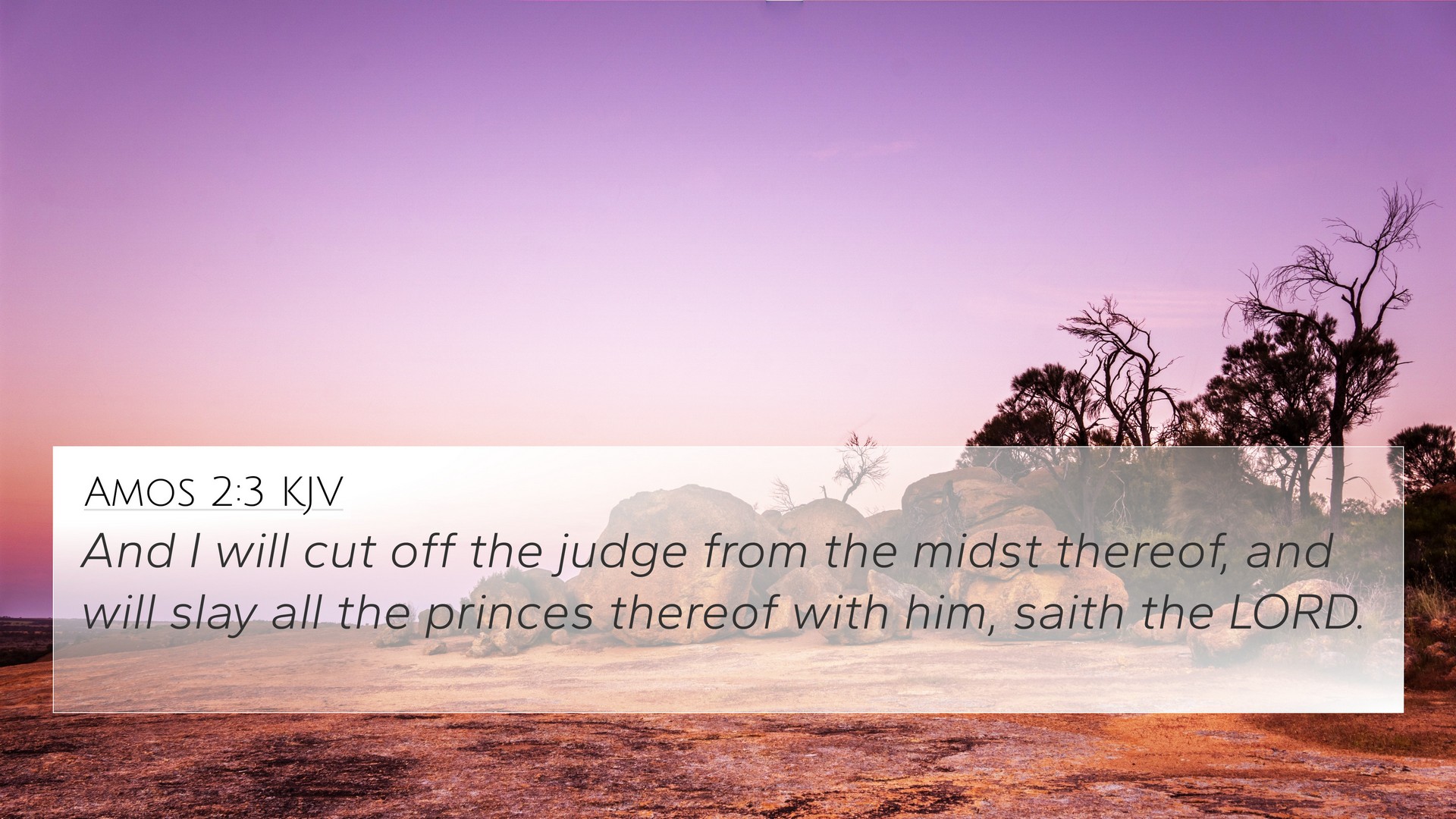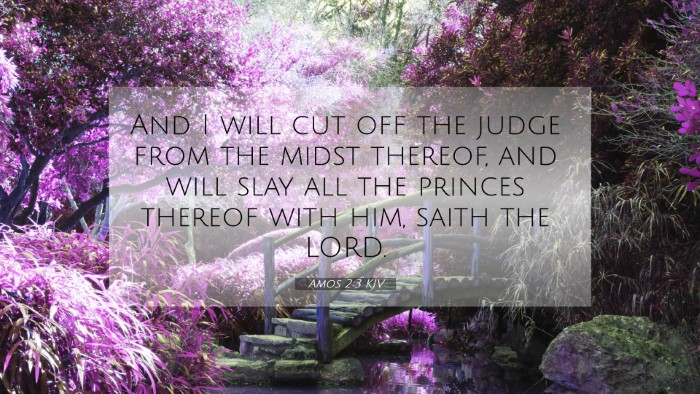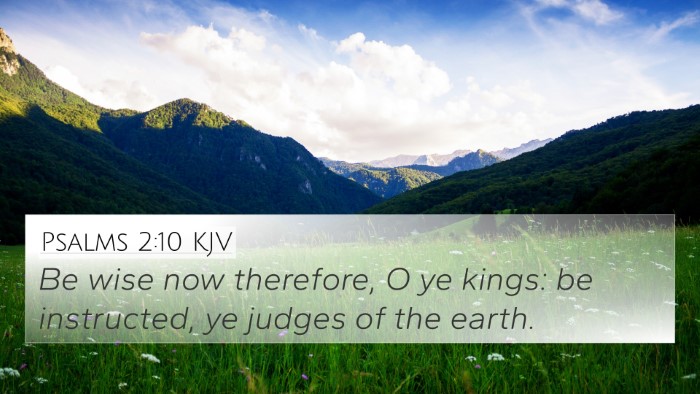Old Testament
Genesis Exodus Leviticus Numbers Deuteronomy Joshua Judges Ruth 1 Samuel 2 Samuel 1 Kings 2 Kings 1 Chronicles 2 Chronicles Ezra Nehemiah Esther Job Psalms Proverbs Ecclesiastes Song of Solomon Isaiah Jeremiah Lamentations Ezekiel Daniel Hosea Joel Amos Obadiah Jonah Micah Nahum Habakkuk Zephaniah Haggai Zechariah MalachiAmos 2:3 Similar Verses
Amos 2:3 Cross References
And I will cut off the judge from the midst thereof, and will slay all the princes thereof with him, saith the LORD.
Uncover the Rich Themes and Topics of This Bible Verse
Listed below are the Bible themes associated with Amos 2:3. We invite you to explore each theme to gain deeper insights into the Scriptures.
Amos 2:3 Cross Reference Verses
This section features a detailed cross-reference designed to enrich your understanding of the Scriptures. Below, you will find carefully selected verses that echo the themes and teachings related to Amos 2:3 KJV. Click on any image to explore detailed analyses of related Bible verses and uncover deeper theological insights.

Numbers 24:17 (KJV) »
I shall see him, but not now: I shall behold him, but not nigh: there shall come a Star out of Jacob, and a Sceptre shall rise out of Israel, and shall smite the corners of Moab, and destroy all the children of Sheth.
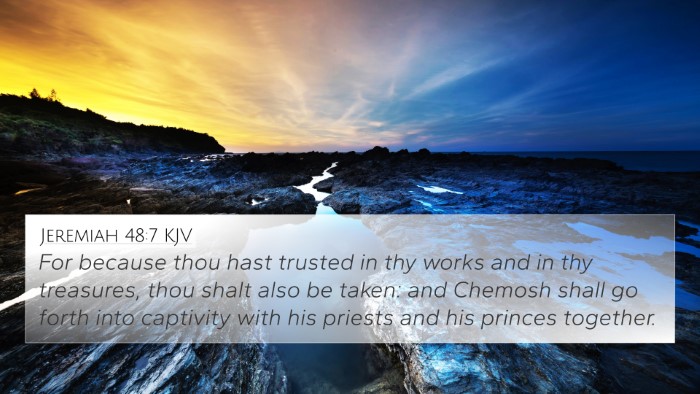
Jeremiah 48:7 (KJV) »
For because thou hast trusted in thy works and in thy treasures, thou shalt also be taken: and Chemosh shall go forth into captivity with his priests and his princes together.
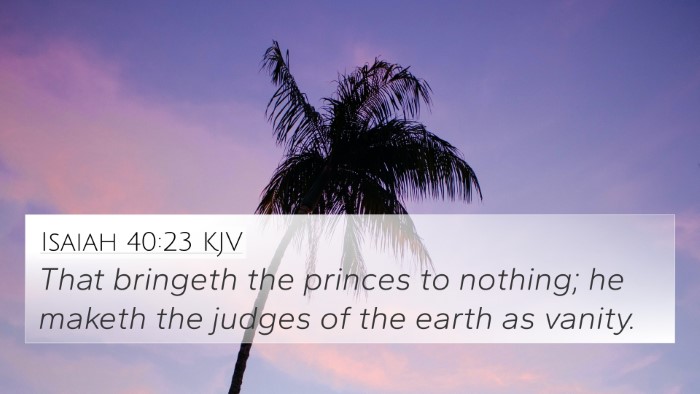
Isaiah 40:23 (KJV) »
That bringeth the princes to nothing; he maketh the judges of the earth as vanity.
Amos 2:3 Verse Analysis and Similar Verses
Amos 2:3 - Summary and Interpretation
Amos 2:3 states: "And I will cut off the judge from the midst thereof, and will slay all the princes thereof with him, saith the Lord." This verse highlights God's judgment against Israel's leaders for their corrupt practices and moral failings. The judgment is extensive, cutting off both political and social leadership.
Insights from Public Domain Commentaries
-
Matthew Henry: Henry stresses the severe implications of this verse, emphasizing that it reflects God's justice and the consequences of deviating from righteousness. The removal of judges signifies that God's order will be disrupted as a punishment for the prevailing injustices.
-
Albert Barnes: Barnes elaborates on the societal implications of this judgment. He notes that the leaders who are corrupt not only lead the people into sin but also are the first to face the reckoning. The cutting off of judges and princes illustrates the depth of the impending ruin that will befall the nation.
-
Adam Clarke: Clarke highlights that the rulers' actions caused oppression and injustice among the people, and thus they bear the responsibility for God's impending judgment. He interprets the "cutting off" as a direct divine action that removes the support of governance due to their moral failures.
Bible Cross-References
- Isaiah 1:23 - "Your princes are rebellious, and companions of thieves; everyone loves gifts, and follows after rewards: they judge not the fatherless, neither doth the cause of the widow come unto them." This verse parallels the corruption in leadership found in Amos.
- Ezekiel 22:27 - "Her princes in the midst thereof are like wolves ravening the prey, to shed blood, and to destroy souls, to get dishonest gain." It illustrates the parallel of predatory leadership in both texts.
- Micah 3:1-3 - "And I said, Hear, I pray you, O heads of Jacob, and ye princes of the house of Israel; Is it not for you to know judgment? Who hate the good, and love the evil; who pluck off their skin from off them, and their flesh from off their bones." This highlights the negative consequences of corrupt governance.
- Jeremiah 22:1-5 - Offering a direct appeal to leadership, which connects to God's expectations of justice and righteousness from those in authority.
- Proverbs 29:2 - "When the righteous are in authority, the people rejoice: but when the wicked beareth rule, the people mourn." A reminder of the impact of leadership on the community.
- Isaiah 10:1 - "Woe unto them that decree unrighteous decrees, and that write grievousness which they have prescribed." This is a direct condemnation of unjust rulings by leaders.
- Zephaniah 3:3 - "Her princes within her are roaring lions; her judges are evening wolves; they gnaw not the bones till the morrow." This reinforces similar themes of corruption in leadership.
- 1 Peter 2:14 - "Or unto governors, as unto them that are sent by him for the punishment of evildoers, and for the praise of them that do well." A New Testament parallel about the role of authority and governance in upholding justice.
- Romans 13:1-2 - "Let every soul be subject unto the higher powers. For there is no power but of God: the powers that be are ordained of God." Reflecting the concept of divine authority over earthly rulers.
- Luke 12:47 - "And that servant, which knew his lord's will, and prepared not himself, neither did according to his will, shall be beaten with many stripes." This relates to the accountability of those in positions of authority.
Thematic Connections and Analysis
The themes present within Amos 2:3 resonate through various scripture passages, demonstrating a consistent biblical narrative concerning the nature of leadership, accountability, and divine judgment. The recurring motifs include:
- Divine Judgment: The expectation of righteousness from leaders and the consequences of failing in that duty is a prominent theme across the Bible, as seen in the cross-references above.
- Social Justice: This verse and its connections spotlight the essential biblical principle of just governance, where leaders are expected to protect the vulnerable and uphold righteousness.
- The Role of Authority: A consistent examination of how leaders ought to lead, paralleling the expectation of moral integrity and accountability found within both Testaments.
Practical Application for Study
For anyone looking to delve deeper into the implications of Amos 2:3, employing tools for cross-referencing Biblical texts can illuminate the connections between various verses. Here are a few suggestions:
- Bible Concordance: A useful tool to find key words and locate related verses.
- Bible Cross-Reference Guide: Helps in traversing through linked scriptures effectively.
- Comprehensive Bible Cross-Reference Materials: Employ these resources for scholarly and devotional studies.
- Cross-Referencing Bible Study Methods: Techniques such as thematic studies or narrative comparisons can enhance one's understanding.
Conclusion
Amos 2:3 serves as a powerful reminder of God's justice and the expectation of integrity from those in authority. As we explore connections between Bible verses, we gain insight into God's will not only for leaders but for all of His people. Engaging in comparative Bible verse analysis enriches our understanding of scriptural lessons, encouraging a pursuit of righteousness in personal, communal, and spiritual realms.
